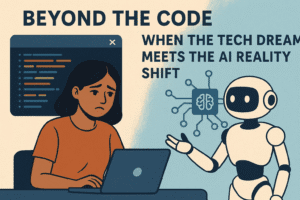Beyond the Code: When the Tech Dream Meets the AI Reality Shift
Manasi Mishra, an Indian-American computer science graduate from Purdue University, embodies a growing crisis in tech hiring. Despite years of preparation and a “learn to code” ethos promising guaranteed careers, her only post-graduation offer was part-time work at Chipotle—a role she couldn’t afford to accept. Her viral plea highlights a harsh reality: entry-level tech jobs are vanishing as AI rapidly automates coding tasks.
Recent data reveals computer science and engineering graduates now face unemployment rates exceeding 6-7.5%, surpassing even art history majors. This shift stems from AI tools replacing junior developer roles while demand concentrates on senior architects and AI-savvy specialists. The crisis exposes deeper flaws in career narratives: technical skills alone no longer ensure stability, forcing graduates to pivot toward system design, ethics, and domain expertise where human ingenuity remains irreplaceable.

Beyond the Code: When the Tech Dream Meets the AI Reality Shift
Manasi Mishra did everything right. The California native built her first website in elementary school, majored in computer science at Purdue University, and embodied the “learn to code” mantra championed by tech billionaires and U.S. presidents for over two decades. Yet, upon graduating in May 2025, her inbox echoed with silence. The only offer? 10 hours a week at Chipotle – a position she couldn’t survive on.
“Please hire me,” she pleaded in a viral TikTok video, her words resonating with a generation promised security through coding.
Mishra isn’t an anomaly. She represents a stark, accelerating trend: computer science graduates now face some of the highest unemployment rates among degree holders – 6.1% for CS and 7.5% for engineering graduates. This surpasses rates for biology and even art history majors. The “safe path” to a six-figure salary is cracking under the weight of AI’s relentless advancement.
Why the Sudden Shift? Beyond Simple Automation
For years, the narrative was ironclad: learn to code, secure your future. Enrollment in CS programs more than doubled between 2014 and 2024. But the landscape has fundamentally changed:
- AI as the Prolific Junior Coder: Tools like GitHub Copilot and advanced code generators can now produce functional, even sophisticated code in seconds. Tasks that once took junior developers hours or days – boilerplate code, debugging simple errors, implementing standard features – are increasingly automated. Employers, facing economic pressures and efficiency drives, are recalibrating their need for entry-level human coders.
- The Experience Squeeze: While AI handles routine tasks, the demand for senior engineers who can design complex systems, solve novel problems, integrate AI tools ethically, and understand business needs remains high. This creates a dangerous gap: entry-level positions are evaporating, making it harder than ever for new grads to gain the experience needed to move up.
- The “Learn to Code” Oversaturation: The very success of the “learn to code” movement created a surge in graduates just as AI began impacting the most accessible entry points. The market is flooded with junior talent chasing fewer traditional coding roles.
The Human Cost: More Than Just a Job
Mishra’s story highlights the profound human impact:
- Shattered Expectations: Years of dedicated effort, significant financial investment in education, and adherence to the prescribed path culminating in joblessness creates deep disillusionment.
- Financial Precarity: Turning down even a minimal offer like Chipotle underscores the immediate financial crisis many face without a tech salary, burdened by student loans.
- Identity Crisis: For many who built their identity around being a “coder,” this shift challenges their sense of purpose and value in the workforce.
Navigating the New Reality: Adaptability is the New Currency
The path forward isn’t despair, but adaptation. The core value of a CS degree isn’t obsolete, but its application must evolve:
- Shift from “Coder” to “AI Collaborator & Architect”: Focus on skills AI can’t replicate:
- Problem Framing & System Design: Defining complex problems and architecting solutions where AI is a tool, not the sole executor.
- Domain Expertise: Combining tech skills with deep knowledge in fields like healthcare, finance, or climate science to create meaningful AI applications.
- Ethics, Bias Detection & Governance: Ensuring AI systems are fair, transparent, and accountable is becoming paramount.
- Human-Centric Design & UX: Creating technology that truly serves human needs and integrates seamlessly.
- Embrace Continuous, Agile Learning: The half-life of technical skills is shrinking. Success hinges on the ability to rapidly learn new tools, frameworks, and AI capabilities throughout a career.
- Highlight Transferable Skills: New grads must aggressively showcase critical thinking, complex problem-solving, project management, and communication skills developed during their degrees – skills vital beyond pure coding.
- Seek Alternative Pathways: Consider roles adjacent to pure software development: data analysis, cybersecurity, product management, technical sales, IT operations with an AI integration focus, or specialized roles in deploying and managing AI systems.
The Irony and the Imperative
The bitter irony is palpable: those who most diligently followed the “learn to code” advice now find themselves on the sharpest edge of AI-driven disruption. Manasi Mishra’s viral plea is more than an individual cry for help; it’s a stark signal of a tectonic shift in the tech job market.
The era where a CS degree alone guaranteed a lucrative career is over. The new imperative is human ingenuity. Success belongs to those who can leverage AI as a powerful tool while mastering the irreplaceably human skills of creativity, strategic thinking, ethical judgment, and deep domain understanding. The challenge isn’t just to build the technology, but to define its purpose and guide its impact – a task far beyond the reach of any algorithm. The future of tech work isn’t about replacing coders; it’s about evolving what it means to be a technologist.
You must be logged in to post a comment.